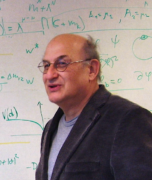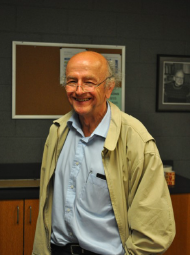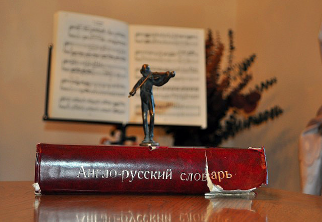The Fragility of Civilization
Published in: 24. Shift of Instinct
Mikhail Shifman, professor of theoretical physics at the Institute of Theoretical Physics at the University of Minnesota, is one of the world’s leading experts in the field of quantum chromodynamics and supersymmetric Yang-Mills theories. He received his doctorate in 1976 (Moscow Institute of Theoretical and Experimental Physics).
He has received the Alexander von Humboldt Prize, the Sakurai Prize in Theoretical Particle Physics, the Julius Edgar Lilienfeld Prize, the I.Ya. Pomeranchuk Prize, and the Dirac Medal for his outstanding contribution to physics. He was elected as a member of the National Academy of Sciences.
He is the author of several books, more than three hundred scientific publications, a number of popular articles and articles on the history of high-energy physics.
If you look at the past, a hundred or even fifty years ago, it becomes clearly apparent how large a shift has occurred in public consciousness.
Much that seemed permissible and even natural then — irremovable leaders without a popular mandate, wars, violence, social manipulations, oppression of minorities, wild social experiments — has begun to look unacceptable, at least for the civilized part of humanity. I would like to say that this will last forever, that there is no turning back.
Is that true? One example, still alive in the memory of my generation, haunts me. Until 1933, Germany was undoubtedly the most advanced state, both economically and culturally, a country that had given the world Nietzsche, Leibniz, Kant, Bach, Beethoven, Goethe and Heine … The list goes on and on. Germany was the scientific mecca of the world then, and German was the lingua franca, the scientific Latin of the 20th century. All outstanding physicists — and theoretical physics has been “my” science for forty years now — sought to reach the University of Göttingen.
Who has heard of it today? In the 1930s, German science regressed by decades. Science (and advanced technology in general), like the Olympic torch, is passed from generation to generation, from hand to hand. In physics, it was enough to expel several dozen scientific leaders from the country, and this chain was interrupted. Eighty years have passed, but the relative level of fundamental science in Germany has not reattained what it was before 1933, and — I dare to make an assumption — will never attain that again.
In society, standards of perception and behavior, and morality as a whole, are passed on in the family from parents to children. Deform one link, and you cripple society for several generations. The recovery of society is a very slow and painful process. This can be observed in modern Russia. Bolshevik morality (more precisely, the complete absence thereof) and communist labor (anti) ethics tore the social fabric.
When I studied history in university, to be honest, I did not understand why, after the fall of the Roman Empire in Europe, the level of social relations, technology, knowledge and culture had slipped to almost zero. After all, there were still scholarly books and people who read them, still builders, artisans and traders, still theater…
Now I think I understand. The barbarians who entered the Roman Empire broke several important links. In relative numbers, they actually killed a fairly small number of key “players” and destroyed the connections and networks formed by these people. This was enough to destroy civilization for a thousand years.
But back to Germany. In 1933, the party led by Hitler, the National Socialist Workers Party of Germany, won the democratic elections. On January 30, 1933, President Hindenburg appointed Hitler the Reich Chancellor, head of the Imperial Cabinet. Less than a month later, on February 27, there was a fire in the parliament building — the Reichstag. According to the official version, the Dutch Communist Marinus van der Lubbe, who was captured during the fire, set the fire. In fact, the arson was planned by the Nazis and directly carried out by Hitler’s Stormtroopers (Sturmabteilung, also known as Blackshirts) under the command of Karl Ernst. The very next day after the fire, Hitler submitted a decree to Hindenburg on the suspension of the seven articles of the constitution and the empowerment of the government. Hindenburg signed it.
The elimination of one structural detail led to an avalanche that could no longer be stopped. Are we sure that in today’s world, in today’s United States, this is impossible?
Conversations with German professors
I have been going to Germany for a long time. Since I revolve in academic circles, naturally, I communicate mainly with professors. Ah, those German professors! … Nowhere in the world are university professors respected as much as in Germany (and in neighboring Switzerland and Austria). If you are a professor, at the official level you will be addressed as Herr Professor Doktor N, and your wife will be called Frau Professor Doktor N. You will have a personal secretary, and your neighbors will be proud of having you in the neighborhood. All German professors (at least everyone I know) play music: someone plays the piano, someone plays the violin, someone plays the flute, and on Saturday evening they gather and play classical trio or quartet. They have preserved some medieval seminary traditions: the university canteen is always called Mensa, the seminars do not begin sharply, say, at eleven o’clock, but always at a quarter past eleven, at a quarter past one, etc. After a lecture, the speaker is not applauded but knocked for, with knuckles, on the table. And finally, in the evening, the whole group take the speaker to an unpretentious German restaurant, one of those where tourists do not go. They serve cold beer and simple German food, which is much dearer to my heart than, say, refined French cuisine, simply because my grandmother fed me some of this menu in my childhood.
I like it there, I love having everything in order, probably I have some German gene…
After the second or third round of beer, the conversation usually spills over to common human issues. And I always ask the same question: how could it happen that in a country that gave the world such titans as Kant, Leibniz, Goethe, Beethoven, which was the most advanced technological power of that time, and dominated the scientific world to such an extent that German became scientific Latin — how could it have happened that crazy Hitler won the 1933 election in an absolutely democratic way? Why?
The answers that I receive can be divided into three or four groups. The largest group consists mainly of professors between the ages of forty and sixty. They don’t particularly want to go into the past. Nothing substantial can be coaxed out of them. It is usually said that a special love for order, a characteristic feature of the German national character, apparently played a role. And then they immediately switch to the present. “We learned a lesson,” they say, “and built a real socially oriented democracy (emphasis on democracy) with the highest level of cultural tolerance and openness, with a powerful economy … We are the first in Europe.”
The second group usually includes elderly maestros who remember the war. In the 90s they were still very active in physics, and I often crossed paths with them on my scientific journeys. In 2001, the Humboldt Society celebrated the 100th anniversary of Werner Heisenberg with a large conference on the history of science, in Bamberg. I will tell about that separately. There were many elderly historians at this conference, and every evening at dinner I talked with them by turn. They were more likely to talk about the causes of past events. “You see,” they said, “when inflation eats up your income, when you expect every day that you’ll lose your job and you don’t have enough money for food and an apartment, at such times ordinary people don’t have any use for Kant and Goethe and moral principles at all. If at that moment a leader says he knows how to save the country, then ordinary people follow him. And the intelligentsia? What could the intelligentsia do? After all, one cannot demand intelligent people to commit suicide. The intelligentsia was forced to tacitly agree. Some of the patriotic intelligentsia believed that at that historical moment Hitler was not a bad way to save Germany, although they despised him at heart. We are not to blame.”
The third group is the smallest. F.L., my long-standing co-author, belongs namely to it.

He calls Euro-socialism a toothless doctrine, and of the party’s general line (probably both parties, I don’t know) he says, “It’s an autobahn smoothly turning into a country road.” He likes America, he spent a lot of time at MIT and was delighted with Boston. Now he has had to retire (in Germany, age sixty-five is the mandatory upper limit for employment).
Young people in the fourth group most often respond with what they learned in textbooks. They themselves haven’t thought through this question. That’s only natural, though: for them it is deep history, like the Great Depression for young Americans.
I still don’t know who came up with the idea (and why) to invite me to Bamberg for a conference of science historians. Perhaps due to my having previously published a couple of amateur (i.e., unprofessional) articles about the discovery of supersymmetry in the Soviet Union — a discovery little-known in the West (since Wess and Zumino rediscovered this theory independently two or three years later, and the Soviet Union in those years was cut off from the world by an iron curtain).
Anyway, I accepted this invitation. And I even came up with a lecture topic which, perhaps, no one but me could have thought of.
The conference was dedicated to the centenary of Heisenberg. After the war, Heisenberg found himself in scientific isolation. Many (non) German physicists at conferences would not shake his hand because of his collaboration with the National Socialists.
God works in mysterious ways
Heisenberg began to work on a very strange “theory” of his own, and the scientific community completely ignored it. In the 1960s, he collected all his results and published a book (which, apparently, hardly anyone had read). By coincidence, the book was translated into Russian, and in 1970 I bought it at a street bookstall, it seems, for 1 ruble 20 kopecks. I brought it home and began to read. At that time, I was a beginning student and, of course, understood very little. There was one chapter in which Heisenberg made a blunder. Discussing spontaneous symmetry breaking, he considers a particle with spin-1/2 as the corresponding Goldstone particle. Even I knew that this could not be right, the Goldstone particle must have spin zero. Heisenberg could not have not known this! At this point, I decided the “old man” had gone completely senile, and slammed the book shut.

And now I come to the most interesting moment. At the same time in Kharkov, Dmitry Volkov read Heisenberg’s book. Volkov worked at the Kharkov Institute for Physics and Technology (KHIPT), where very few scientific journals made it in from abroad, Western visitors were a rarity, and translated books were almost the only source of information about the latest achievements in the West (of course, the “latest” ones were very late). So, after reading this chapter, he immediately realized that Heisenberg had written nonsense, but, being an experienced and talented physicist, unlike me, he did not put the book on the bookshelf to forget about it, but began to think about whether it was possible to get rid of the mistake but save the result. Is it possible to really obtain a Goldstone particle with spin-1/2? So, together with his student Volodya Akulov, he discovered supersymmetry. The deepest revolution in theoretical physics of the second half of the 20th century ensued. (Of course, I simplify the situation somewhat, but otherwise I will not fit into the framework of this essay.)
I read all this in a booklet of Volkov’s memoirs, published in Kharkov in an insignificant edition. Of course, no one has read that either. I was struck by what unconventional ways God has of leading us to new discoveries. Everyone thought Heisenberg’s last twenty years were essentially junk in a scientific sense. But it turns out that from one of his mistakes, quite unexpectedly, on the other side of the earth, a beautiful, deep and powerful theory grew. That’s what I said in my talk.

In Bamberg, I met one old wise professor who was already retired (a Professor Emeritus). “Don’t believe them,” he said, pointing to his colleagues, “when they say that nothing could be done and the intelligentsia is not to blame. In the late 1920s and early 30s, the communist idea was not merely popular among intellectuals, it became fashionable, and many abruptly turned left to radical Ernst Thälmann. This scared the cautious majority. Some intellectuals, on the contrary, turned right due to thwarted national pride. Most shut their eyes to everything and went about their business. In the late 1920s and early 1930s, when it was still not too late, no one rang the bell and no one offered a ‘middle way.’ So they got what they got.”
He was silent for a while, thought and added: “What’s happening now bothers me. I respect environmental issues very much, but look at the current Greens. Those young people are ignorant and fanatical, and fanaticism never leads to any good. Just declare yourself Green, and everyone will forgive you. Take Joschka Fischer, the most popular politician today. He didn’t just sympathize with Mao and study his speeches, he was in the terrorist group Revolutionärer Kampf. Well… it seems, we, in our national character, have something that allows us to bring any idea to the point of absolute absurdity in a methodical way…”
He was probably pleased that I had listened carefully to him for several evenings, and before leaving this professor gave me a small bronze violinist.


Speak Your Mind